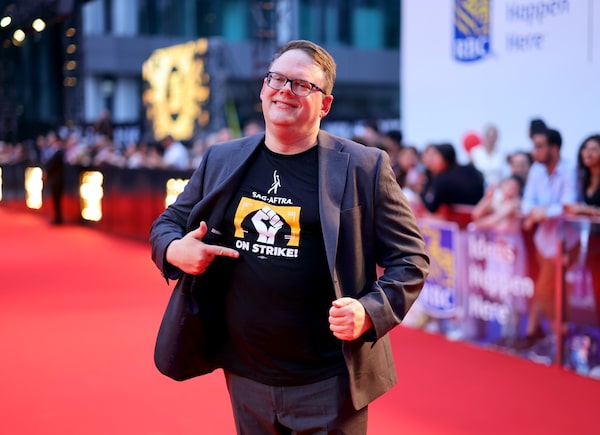
Duncan Crabtree-Ireland, SAG-AFTRA National Executive Director and Chief Negotiator, attends The Boy and the Heron premiere during the 2023 Toronto International Film Festival at Roy Thomson Hall on Sept. 7.Matt Winkelmeyer/Getty Images
The most important Hollywood person at the Toronto International Film Festival this weekend is not a director, actor, studio executive or high-powered agent: it is one unassuming labour expert who no one outside of the entertainment industry has likely ever heard of.
On Friday, Duncan Crabtree-Ireland, the national executive director and chief negotiator for the Screen Actors Guild-American Federation of Television and Radio Artists (SAG-AFTRA) arrived at TIFF to participate in a live discussion about the strikes tearing the industry apart. His attendance puts a spotlight on not only critical issues affecting entertainment workers in the United States but also Canada – he’ll be staging a joint rally with members of the Alliance of Canadian Cinema Television Radio Artists (ACTRA) on Saturday in solidarity with that union’s 500-plus-day battle with the Institute of Canadian Agencies.
Ahead of his onstage festival appearance, Crabtree-Ireland spoke with The Globe about the distressing state of negotiations, the optics of stars appearing at film festivals, and what it’s like being the face of Hollywood’s fight for fairness.
Where are negotiations right now compared to when they started in July?
There’s been no real progress since July 12, and since then, despite my daily urging, the studios have not agreed to come back to the table. There is no date on the calendar to do that. I hope that they will change their minds and go back tomorrow, but I don’t see any indication of urgency to get this resolved. We’re starting to see the financial impact on the companies, with Warner Bros. Discovery forecasting a drop of up to $500-million in losses. Perhaps that will motivate them.
How do you maintain a level of optimism if you don’t see those signs of urgency?
There have been people who imagined that once we got into September, things would shift. We’re seeing that with linear television networks, whose schedules are now made up entirely of reality programming. Every day it becomes more clear what the companies are losing by not having access to the creative talent which is the foundation of their success. And an event like TIFF demonstrates that – the only productions here with actors promoting them are ones that secured interim agreements with SAG-AFTRA.
Some films received interim agreements to have their stars attend TIFF, but then the talent still didn’t feel comfortable. How do you deal with the optics of a nuanced issue that can be confusing for the average consumer?
Me being here is one example. The main reason I’m at TIFF is to be an in-person symbol of the fact that it’s not just okay for our members with interim agreements to come and promote their films, we encourage it. We want those films to be successful. And it’s a time-tested strategy – we used interim agreements in previous strikes, too. The purpose is to keep pressure on the big producers while demonstrating that our contract is fair and represents a reasonable set of demands.
Is there a kind of cognitive dissonance of coming to TIFF where you have this platform while at the same time a block down the street there’s a studio you’re at odds with that is having a big premiere?
We can’t stop them from having premieres, but we can say that actors are not going to be a part of that. Sure, they’re keeping a game face on, but we see through that and we know that they are in fact desperate to have our people there.
How does it feel to be the face of this on the labour side? I feel that since SAG-AFTRA president Fran Drescher delivered her fiery rhetoric in the beginning, we’ve mostly been hearing from you on the matter, though she is also currently running for re-election.
I think it’s a balance, because she has done a lot of press on the matter and she’s a tremendous leader. Every person that I have talked to about this strike has heard or seen her initial news conference, and her passion and clarity moved us forward tremendously. She and I are a team moving things forward. And this is not a fight that you do half-heartedly. This is an existential battle with the biggest, most powerful companies in the world. You have to be all-in.
This interview has been condensed and edited.
 Barry Hertz
Barry Hertz